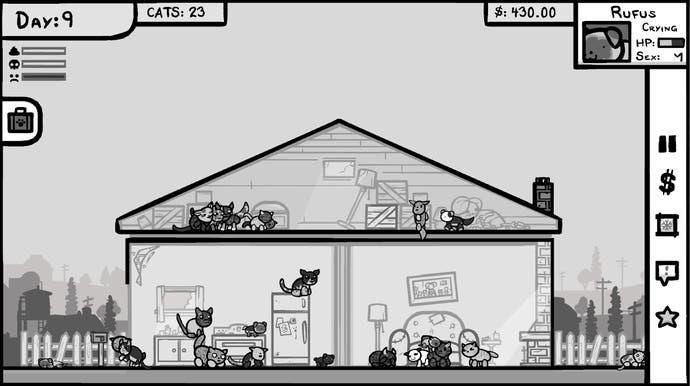Team Meat on cats, consoles, and its wish for Super Meat Boy
Not keen on future consoles, but will develop for Nintendo if Super Meat Boy could join Super Smash Bros.
Super Meat Boy creators Edmund McMillen and Tommy Refenes at Team Meat really like cats. While Refenes only has one feline companion, McMillen has four - one of which, the hairless Tammy, played a fairly large role in Indie Game: The Movie, last year's high-profile film that detailed the team's plight as it created Super Meat Boy. Despite this, McMillen isn't afraid to call Tammy "a total bitch". I sure hope Tammy isn't reading this.
That's the fun thing about interviewing Team Meat. They're an outspoken pair and not afraid to rip their pets - or previous publishers - a new one. And so they did during our nice long chat about the team's upcoming "cat lady simulator" Mew-Genics, the future of consoles and the duo's dream for Super Meat Boy.
Conventional wisdom might dictate that Team Meat's upcoming game Mew-Genics was inspired by the creators' cumulative five cats, but it's actually a lot simpler than that. The pair entered a Ludum Dare game jam where one of the potential themes was "a thousand kittens". "We thought, 'hey, that would be fun to make,'" says Refenes, who eventually came up with the title with McMillen's wife, Danielle. It turned out the cats theme didn't win the vote and the game jam's theme became evolution instead, but Team Meat decided to make a game about a thousand cats anyway, because well, cats are cool.
"As Tommy was programming basic AI for cats we started to talk about how we were basically starting to base all of this stuff on our cats," says McMillen. "The four cats that I have are extremely different personality-wise. They all have things that they like, things that they hate, cats that they like, cats that they hate. They all have very distinct temperaments and personalities, and it was pretty interesting to see them and be like, 'we could do that.'"

Such behaviours as staring into space not doing anything, pooping in places that aren't the litter box, loving to be pet one minute only to turn on you the next, and a complex trauma system are all based on actual observations of the creators' cats.
"It's like a Turing test for cats," Refenes explains. "If we can program a cat and you can't tell if it's a real cat or not, we win.
"There is no set template for cats, which makes my job very, very technical. It would be easy to program a dog. Cats will turn on you for no reason."
The frankly bizarre, nearly impossible to comprehend psychology of felines gives the "cat lady simulator" its claws. Mew-Genics is a challenging game, just not in the same sense as Super Meat Boy.
"A better way to describe what we want to do is not necessarily how difficult something is in terms of reflex and motor skills, but more in terms of making sure something feels rewarding," says McMillen. "Basically we're tackling how to make this game meaningful in a way that goes above and beyond what is expected in games now."
"[Cats] get diseases if they go outside and eventually they die... This is the reality of a cat owner. And there's a beauty in that."
Edmund McMillen, Team Meat
"We want there to be actual consequences to your actions. We want there to be more of a reality. In a lot of ways, even though the game is so f***ing weird, what will make it shine is how true to reality it is and how it doesn't sugar coat it for you," McMillen continues. "Like there's a chance you'll have this cat, and you love this cat and you've been working on it forever and it's growing old and it's not breeding and you have no offspring for it, and every time you take that cat out of the cryogenic chamber you run the risk of that cat dying permanently and being gone forever. And there's something to that that makes it exciting."
McMillen explains that in most video games of this nature you can simply pull up a previous save file and reload, but that isn't an option in Mew-Genics. Instead, the cats in the game, just like real cats, grow old and die, even if you have cryogenic chambers you can preserve them in. "You can try to pump as much drugs as you can into a cat's system to prolong its life as much as you possibly can, but there's a good chance it will eventually die if you keep taking it out. There's something to that that makes the risk/reward factor of a game like this so much deeper and so much more connected and personal."
Cats "get diseases if they go outside and eventually they die," says McMillen, telling it like it is. "This is the reality of a cat owner. And there's a beauty in that in how real they are."
As it turns out, Mew-Genics is more than just a cat simulator, but it's unclear exactly what else it is. Team Meat is a little cagey about the structure as it's still figuring that out (the game has only been in development for four months), but the studio explains it has multiple endings and branching paths.
"The game progresses down a semi non-linear path and you do end up with these endings, but not in the way you might think. The game becomes a completely different monster as you play," McMillen explains. "It kind of turns into a different game where you're essentially bending the rules of the universe to get what you want, which seems like it has nothing to do with cats, but it does."
It's not just The Sims with cats, then. "You could say the simulation is kind of like the meat in the entree that is the game." McMillen says. "You're going to sit down to your meal and the meat's going to be there, but there's also going to be a heaping helping of giblets." Nevermind giblets are still meat, but this is Team Meat we're talking about, so we can excuse the overly carnivorous metaphor.
"It's impossible to be tired of cats."
Tommy Refenes, Team Meat

When I ask if the studio is concerned cats are too popular and people may grow tired of them, Refenes aptly states: "It's impossible to be tired of cats."
"If a large company jumped on this and said, 'we're going to do a cat game,' they wouldn't do it the way we're doing it," adds McMillen. "People who own cats will appreciate what we're doing as it doesn't sugarcoat the fact cats have assholes that they stick on things."
"Even if you were to play the game all sweet it still doesn't sugarcoat the fact if that litterbox is full that thing is going to s*** on your pillow," notes Refenes. But he's right. Cats can be jerks and they ruin our stuff, but we love them anyway. Anyone who says otherwise is clearly lying.
When asked about micro-transactions (it only seems right given current events), Team Meat is adamant this wouldn't be the sort of casual money-grubbing sim one typically associates with the iPad. "We're going to handle this in the most respectful way possible when it comes to the user and not make garbage games that abuse people and take their money," says McMillen.
"We're making a game for a platform. We're not making a manipulative way to guilt people out of money."
Tommy Refenes, Team Meat
"We're making a game for a platform. We're not making a manipulative way to guilt people out of money," Refenes says.
So why the iPad, then? "We want this thing that Ed and I both use to have content on it that's substantial and meaningful," says Refenes. "This is something that millions and millions of people have. That millions and millions of people enjoy. It's up to us as responsible developers to actually try to make a game that's substantial and fun and not manipulative just to show that it doesn't have to be this way."
While Team Meat aims to appeal to a large audience of iPad owners, it's less keen on the iPhone as the pair's unconvinced if the game will play optimally on such a small screen.
"We're not sure about iPhone yet," says Refenes. "It's one of those things where I'm sure it'll run, I'm sure it'll be playable. But how playable? If it's going to be really cramped and you can't grab your cats and move them around and it's clumsy, it doesn't seem worth it to put it on there. Right now it's for sure iPad, Android and Steam. We aren't 100 per cent sure on phone stuff - basically we're not sure about smaller screens. It needs to control well."
When I ask if Team Meat is interested in developing for any of the upcoming consoles or Wii U, Refenes replies starkly, "not really," due to the developer-hostile systems in place with console manufacturers and big publishers.
"We know the stress associated with going into console stuff. When you look at the stress that comes with Steam and iOS and the Google Play store, you look at those and you look at which hoops you'd have to jump through to get on any one of the consoles, it's like, 'is this worth the time? Is this worth the headache?'
"A couple years ago it was definitely worth it because that was the outlet where people like Ed and I and [Braid creator] Jon Blow could put their games because that was the only outlet. But that's not the only outlet anymore and those seem to be the more difficult outlets than just contacting Steam and just putting your game on there and supporting it easily.
"You look at which hoops you'd have to jump through to get on any one of the consoles, it's like, 'is this worth the time? Is this worth the headache?'"
Tommy Refenes, Team Meat

"The overhead cost of just developing for those consoles is insane. It costs zero dollars to develop on Steam if you already have a computer. When you look at PlayStation and Xbox and Nintendo you have to buy thousand dollar dev kits and pay for certification and pay for testing and pay for localisation - you have to do all these things and at the end of the day it's like, 'I could have developed for other platforms and it would've been easier.'"
"You have to take into consideration that when you're independent, you don't want to take the risk of jumping on a platform that you have no idea how it's going to do until it's already established," McMillen adds. "When you look at WiiWare, when it bloomed when World of Goo came out it was like, 'Holy s***! This is a great platform to develop for,' and then it was like a gold rush and everybody was jumping on WiiWare.
"What they should have done was wait a little longer to see if it would continue. Because then it just dropped and nobody cared.
"Imagine if we got put in another situation like with Xbox where we were nailed down to this contract of semi-exclusivity and we had to jump through all these hoops and kill ourselves and then pay s***loads of money to get on a platform that's not established yet and then it comes out and doesn't do well - imagine that. That's f***ing horrible."
Refenes isn't confident there's much demand for a new console, anyway. "I don't feel there's enough deviation from what games are currently out to what games are going to be out," he says. "I don't feel there's a need to have anything more than what's out right now."
More than anything, Team Meat is weary of the console market and feels its best chance of staying relevant is to develop for PC and mobile devices.
"You can't be one company and cater to everybody... The way you cater to everybody is by everybody making stuff."
Tommy Refenes, Team Meat
"An iPad comes out and does a year's worth of console sales in a weekend. The people in the market to play games are more apt to grab an iPad or a tablet or a fancy phone because it's more convenient," says Refenes, who notes smart phones and tablets have "something for everyone".
He suggests console manufacturers try to appeal to everybody, but the platforms simply aren't prevalent enough to achieve that. "You can't be one company and cater to everybody," he says. "The way you cater to everybody is by everybody making stuff. That's how you get that massive range, that massive library of software that anybody can use.
"I don't feel confident there's going to be a PlayStation 5. I don't feel confident there's going to be another console after the Wii U. There probably will be, but it's totally diminishing returns."
"It's sad. I like the consoles," laments Refenes. "And I prefer playing something in my living room. But I'm also not in that range of consumer that actually sort of dictates trends at this point."
I presume most Eurogamer readers like buttons, something most mobile devices don't have. Team Meat thinks buttons are going the way of the dodo, but that future generations will get around this.
"I see young little kids and they f***ing love Angry Birds. They love tapping on that little screen. And that generation is what's going to shape the future," Refenes continues. "As much as we may love buttons, what's going to happen is these kids who are growing up with these touch interfaces will come up with the more efficient ways to use them and stuff you and I can't think of right now.

"If you're walking around with a f***ing controller in your pocket it's just not cool."
Ed McMillen, Team Meat
"It's like what Bane said in The Dark Knight, 'We're only adopting the touchscreen. They are born with the touchscreen.' That's what they know. That's what they're going to build off of. I don't feel we're going to see a phone with a controller. We already had that. It was called the Xperia Play and it failed. It failed miserably. I had one. It was good for playing emulators, but that's it."
McMillen reckons most people who own smart phones use them primarily for gaming. "I'd say a majority of people who have iPhones have them because they play games on them. That's a very hard reality. But none of those people want to admit that's what they do mostly on that platform. And if you're walking around with a f***ing controller in your pocket it's just not cool."
Refenes then delivers his Nostradamus-esque prediction for the next 70-plus years: "There's going to be a total saturation and overkill of no controllers. For the kids who are right now under 10, when they're my age there's going to be no controllers whatsoever. However, their kids are going to rebel against their parents and then we'll have controllers like 75 years from now."
"The future is that thing you have in your pocket you set on your coffee table that wirelessly connects to your TV and then you have a controller where you can play whatever games that way. That's the future. It's your f***ing tri-corder you carry around."
"They need a cell phone that wirelessly projects onto a second screen which is your television," McMillen says. "Then it connects to your controllers via bluetooth" adds Refenes, bouncing off his fellow futurologist. "That's what Sony should have made for the PS4. But I feel that's like 10 years away."
"It's either fight the inevitable or realise it and still try to stay relevant in it."
Tommy Refenes, Team Meat
McMillen is unconvinced about the future of consoles, but he doesn't see the keyboard and mouse going anywhere for awhile. "Kids are also growing up with computers with keyboards and mouses and the keyboard and mouse isn't going to be replaced for a very long time," he says. "And it's really not hard at this point to get a controller plugged into your computer," he adds, noting that Super Meat Boy did really well on Steam and he'd like to believe that people played the sadistically hard platformer with a controller.
"There's a crossroads ahead of me as a developer," Refenes ponders. "It's either fight the inevitable or realise it and still try to stay relevant in it. And the smarter thing to do seems like to try to be relevant."
The engine Team Meat's developing for Mew-Genics will power its next several games, though these won't necessarily be exclusive to the iPad. "We don't have loyalty to any specific thing [platform] except what's ideal for us and what would be fun to develop for," McMillen states.

"We went in and found out what it was like to develop for a console and the reality is there's no loyalty on either side and it's a business."
Ed McMillen, Team Meat
"If Nintendo or Sony or Microsoft - well, we'll cut off Microsoft at this point - but if Nintendo or Sony came to us and said, 'we have a minimum guarantee of X, Y, Z, we really want you to develop a game for our next system that's coming out in year whatever, if you have something to work on we want to work with you, here's a free kit to develop for us and here's a minimum guarantee or advance,' then we'd be way more inclined to develop for them, but it wouldn't be an exclusive deal. That's an important thing for us." McMillen would be willing to maybe do a timed exclusive, so long as he could also release on PC and whatever else he wants.
"Nothing is closed off and nothing is for sure. It's literally what feels right and what makes the most sense," Refenes explains.
Still, Team Meat is skeptical of console development after its unpleasant - and well documented - experience with Microsoft developing Super Meat Boy. "We went in and found out what it was like to develop for a console and the reality is there's no loyalty on either side and it's a business," says McMillen. "And when you step in to that business arena it goes from us making art and it turns into business."
"And we're not businessmen," Refenes says, flatly.
"All we know now is how to not get f***ed hard," adds McMillen.
In truth it isn't just Microsoft Team Meat is weary of, it's all console manufacturers. Refenes describes the legal bureaucracy of developing for Microsoft as "like going through an arbitration or divorce".
"It's like we'd have to have a team of lawyers there to make sure they're not sneaking up behind us to try to stick s*** in our asses. But we would do that with any console because honestly they are all the same. They have different departments that work great, but the people at the top - the people who make those decision - the people that you never see, they exist in every single company. The guys we would talk to at Sony or Nintendo or Microsoft, they're not the people that f*** us. It's the people who are their boss' boss' boss who see us as this line item and go, 'oh f*** these guys.'
"All we know now is how to not get f***ed hard."
Ed McMillen, Team Meat
"Okay, let me restate. They don't say, 'f*** these guy', but they do f*** us by making strict business decisions based on what some pieces of paper tell them what other pieces of paper said. It's never intentional, but it is disrespectful."
McMillen finds the system especially disparaging because he thought Microsoft at the very least would change after not just Team Meat but other developers spoke out against its asinine systems. Just last year Fez creator Phil Fish said he couldn't afford to update the title's game-breaking patch because Microsoft charged several grand to submit another patch.
"For a while I really thought Microsoft would change and was changing after the bad experiences were made public about working with them that weren't just us. But from what I've heard recently they have not at all changed," McMillen laments.
"The sad truth of it is they do not need to change," Refenes adds. "Because Xbox Arcade is such a small portion of them overall it does not matter. And they will still attract developers no matter what."
Fittingly, McMillen ties the whole situation to a metaphor about cats. He went to the zoo recently and learned the tiger is the stupidest cat because it's the strongest, so it doesn't need to use its brain to catch prey, whereas a tiny jungle cat is the smartest because it is the weakest and it has to use its intellect to survive.
"You look at Kinect and that was the most ham-fisted garbage device in the world, but they [Microsoft] got it moving because they invested s***loads of money in it and advertised."
Ed McMillen, Team Meat

"In that same respect you've got Steam and you've got Microsoft. And Steam started out as a developer. They were a small-time developer that had some strategic ideas and they didn't have the muscle the tiger had and because of that they were forced to use their brains and not their brawn. And that's the reality. The person who controls the money doesn't really need to strategise about anything. They just throw more money around.
"You look at Kinect and that was the most ham-fisted garbage device in the world, but they got it moving because they invested s***loads of money in it and advertised. In the end you make stupid decisions and don't rely on any intellect at all. That's kind of the way it works with these consoles."
"If they [Nintendo] could guarantee us Meat Boy would be in Smash Bros., we would do something."
Tommy Refenes, Team Meat
When I ask about McMillen's The Binding of Isaac de-make heading to PS3 and Vita, he explains that's only happening because the publisher, Nicalis' head honcho Tyrone Rodriquez, is handling the entire business side. "I told him, 'Here's the deal: I don't want to have to deal with any business people. I don't want want to do any of that service stuff. I'll give you my pieces of paper and my notes that tell you how to make it better and I'll approve all the art and stuff as it goes.'"
McMillen says he would be open to the idea of porting his stuff to consoles "if there were some magical middleman who would just appear and do all of our business for us".
Despite this hatred, there is one thing that would convince Team Meat to develop for Nintendo in a heartbeat: if Nintendo could guarantee to put Super Meat Boy in Super Smash Bros.
"I want Meat Boy to be in Smash Bros," says McMillen. "That would be the one reason I'd really want to develop for a Nintendo console."
"That would be amazing!" Tommy adds. "If they could guarantee us Meat Boy would be in Smash Bros., we would do something."
"Nintendo are you listening? Smash Bros! We would ask for nothing in return. Just f***ing use the character. Put him in the game. It's free!" exclaims McMillen.
This isn't a joke. When I ask if they are serious Refenes says, "If they wanted Mew-Genics or something and they could promise us Meat Boy would be in the game we'd develop Mew-Genics for them. Not exclusively, of course. This is how they would buy it from us. And that's a very cheap price."
You hear the man, Nintendo? Any interest in making this happen?

